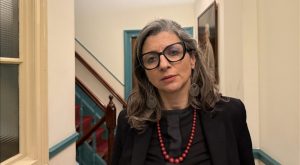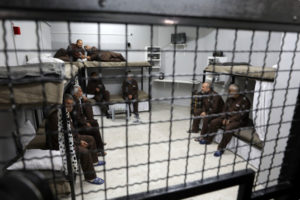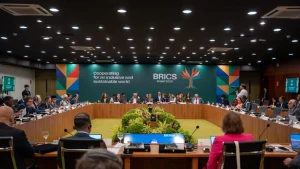The global campaign for recognition of Palestinian statehood is a desperate measure to resuscitate the two-state solution, which is in terminal decline. If, as many believe, such a solution is already drawing its last breath, why does the European Union keep dithering in its recognition of a Palestinian state? It’s safe to assume that this is just another example of how disconnected from the reality on the ground that the predominant discourse within European institutions really is.
The announced postponement for three weeks of the vote on whether to recognise Palestine is believed to be due to the failure of EU lawmakers to agree on the exact wording of the motion.
The original draft, which was initiated by the Unified European Left Party and the Socialists and Democrats Group in the EU parliament, calls for “all EU member states. to recognise the state of Palestine on the basis of the 1967 borders with Jerusalem as the capital.” Middle East Monitor (MEMO) quoted by Mi’raj Islamic News Agency (MINA) as reporting, Saturday.
Also Read: Boycott of Zionism, The Most Powerful Weapon
The wording calls for no more than what is already the international consensus. However, “the right-wing parties, who represent a majority in the European parliament, wanted a wording similar to the Spanish decision, which reads that recognition will be declared after Palestinians and Israelis reach a peace agreement.”
Given the reality of the situation, recognition of a Palestinian state is an artificial milestone in any case; a diplomatic staging post to proclaim an empty victory in a battle which the Palestinians should not have to fight, given Israel’s brutal military occupation.
The EU’s reticence to grant even this small moral victory on a point that is self-evidently correct and proper, in that the Europeans already recognise the Palestinian right to self-determination within the framework of a two-state solution, points to its inability to make the harder choices, the real choices it needs to make for justice and peace in Palestine.
Despite the promising shifts within Europe over the past few years, the snail’s pace at an institutional level demonstrates the EU’s ineffectiveness when it comes to solving the deadlock in the so-called road map to peace.
Also Read: Nuclear Technology: Harm and Benefit from the Qur’anic Perspective
It goes without saying that any political institution that shares an enhanced relationship with Israel has a greater responsibility for ensuring justice and peace in Palestine. On that basis alone, the EU has failed miserably.
EU policy is out of sync with the general public who are dismayed at Israel’s impunity which comes at no political cost. European support for Israel has been on the wane since Operation Cast Lead back in 2009, at a much faster rate than US public opinion.
Back in 2012, in a BBC poll which looked at countries that had the most negative impact in the world, Israel was ranked third, only slightly ahead of North Korea and Iran. Throughout summer 2014 this trend continued and one can say with confidence that in the eyes of the European public Israel has never been as reviled as it is now.
Adding to the countless examples of general apathy in Europe towards politics and disconnection between the people and their governments, Israel’s pariah status and official condemnations have not been translated into meaningful action.
Also Read: Gaza Cries Out, the World Stays Silent: A Wounded Humanity
The EU, despite its unified stance on the illegality of Israeli settlements, has been trading away peace, according to a report commissioned by a former EU commissioner for external relations and twenty-two non-governmental organisations.
The report accuses Israel of establishing a two tier discriminatory system and describes European policy as extremely contradictory. “The most recent estimate of the value of EU imports from settlements provided by the Israeli government to the World Bank is $300m (€230m) a year.
This is approximately fifteen times the annual value of EU imports from Palestinians. With more than four million Palestinians and over 500,000 Israeli settlers living in the Occupied Territory this means the EU imports over 100 times more per settler than per Palestinian.”
On a more significant note, the EU is Israel’s largest trading partner, worth over €27 billion a year, 32 per cent of Israel’s exports and 34 per cent of EU imports. The EU-Israel Association Agreement, which came into force in 2000, is the main treaty governing trade relations between the EU and Israel.
Also Read: Indo Defence Expo and Forum; Sharing Responsibility of Humankind and Environment
In parallel with swelling anti-Israel sentiment, the EU has been under pressure to re-evaluate the privileges afforded to the state despite the fact that they go against EU policy.
In a letter sent last year to the head of EU foreign policy, Catherine Ashton, 23 members of the European Parliament called for the suspension of the trade agreement. Citing countless human rights violations, they called on the EU to enforce the agreement honestly and effectively by noting article 2, which undermines the force of the agreement in the face of human rights abuse and violations of democratic principles. Others have also stated that the agreement has created a climate of impunity.
With unprecedented pressure mounting on many levels, the EU has been splitting hairs in trying to protect its image as a moral force without threatening its primary economic interest through non-recognition and disinvestment of Israeli settlement activity.
In June 2013, it published “guidelines” for its member states saying that it would not confer grants, scholarships, prizes or financial loans on Israeli entities operating outside the so-called Green Line (the 1949 armistice line), including East Jerusalem and the Golan Heights.
Also Read: Safiya Saeed: From Somali Migrant to First Hijab-Wearing Mayor of Sheffield
This issue was central to the months of negotiations between the EU and Israel on the latter’s participation in the EU’s Horizon 2020 project, the union’s largest research and innovation programme scheduled to last for six years with funding of €80 billion.
The agreement states that any Israeli entity operating within the Green Line can apply for European loans, and both sides would examine ways to make sure the money would be restricted and not reach the settlements in any form.
The EU calculation is simple and arcane at the same time. It wants to protect its economic interests with Israel without compromising the political solution to the conflict by targeting only the settlements.
This, though, is not so simple and in reality makes hardly any difference on the ground. Rewarding excessively with one hand while punishing mildly with the other may make economic sense but it has little or no political impact.
Also Read: Why Food Safety is Essential During Hajj Services?
If the EU really wants a political solution, it needs to make decisions that have a real political effect on the situation. Rewarding Israel economically while dithering to recognise a Palestinian state will have no effect whatsoever.
The postponement of the recognition vote also shows the EU to be out of touch with political shifts in Israel, where settlements and the state are not viewed as a conjoined political twin that can be isolated through economic pressure; they are seen as a unified political and economic whole that will never be separated. It’s not just the settlements that are a problem; it is, in effect, Israel’s view of itself and where Palestinians fit in to that vision of the “Jewish state”.
Judged on that basis, EU policy is speaking to a bygone political reality or, to be more precise, a reality that was never intended to materialise based on the memorandum of understanding between the US and Israel which was detailed by Rashid Khalidi in his book, Brokers of Deceit.
The memorandum, drafted in 1978, means that Israel has an effective veto over what the United States can propose regarding the Palestine issue. It restricts US policy on Palestine to Israeli interests, which are intended to obstruct a fully sovereign Palestinian state; Israel will never stop expanding its settlements or give up control of land, water or Jerusalem. Every deal brokered by the United States since then, and indeed the status quo that emerged from the Oslo Accords and that we are living with today, is completely in agreement with the scheme proposed by Begin in 1978.
Also Read: Indonesia Sign Language Mushaf Qur’an; A Sustainable Gift in Celebrating Pancasila Birthday
If two states was really a viable option, the critical juncture for it isn’t now but decades ago. The Oslo accords signed by Israel, according to academic Ilan Pappé, was a solution to the paradox that had long troubled Israel, of wanting the physical space without the people on it. This was the predicament of Zionism from day one: how to have the land without its indigenous people in a world that no longer accepts colonialism and ethnic cleansing.
Something has changed in the Israeli view of Oslo since 2000. The political powers in Israel before then, claims Pappé, were genuine in their offer of Area C of the West Bank plus Gaza to the Palestinians for statehood. The political elite in charge of Israel now, however, while employing the discourse of “two states”, has established, without declaring it publicly, an Israeli state in which Palestinians in the West Bank will be in the same secondary status as those living elsewhere inside “1948” Israel. They have also found a special solution for the Gaza Strip; they will turn it into a massive ghetto.
Brazenly, Israeli Prime Minister Benjamin Netanyahu has made statements to that effect declaring that “Israel doesn’t think it needs a separate Palestinian state to feel safe.” He also signalled clearly that the two-state solution was off the table. In a speech discussing this summer’s Operation Protective Edge, he made this stark pronouncement: “I think the Israeli people understand now what I always say: that there cannot be a situation, under any agreement, in which we relinquish security control of the territory west of the River Jordan.”
It’s becoming increasingly clear that the EU’s policy is fixated on a non-existent reality. The critical point now is how to stop a civil war, whereby Israel will find the perfect opportunity to carry out another round of ethnic cleansing and end its historical dilemma of wanting the land without its people. The EU needs to consider how to stop the total annexation of Jerusalem and the destruction of Al-Aqsa Mosque, with the attendant risk of a further intensification of killing and bloodshed in the region.
Also Read: Leila Khaled, The Icon of Palestinian Women’s Resistance
If the EU really wants to be an important player, which it must if more pressure is to be applied on Israeli to end its occupation, singling out settlements is not enough. It needs to stop rewarding Israel through greater economic ties; it needs to show Israel that there is a greater political price for its occupation and not just a political parking ticket. At the very least, the EU needs to back its own policy in furthering Palestinian statehood by recognising a Palestinian state. (T/P002/P3)
Mi’raj Islamic News Agency (MINA)
Source: https://www.middleeastmonitor.com/articles/europe/15542-does-the-eu-really-want-a-two-state-solution
Also Read: The Twilight of the Zionist Israeli State



































 Mina Indonesia
Mina Indonesia Mina Arabic
Mina Arabic